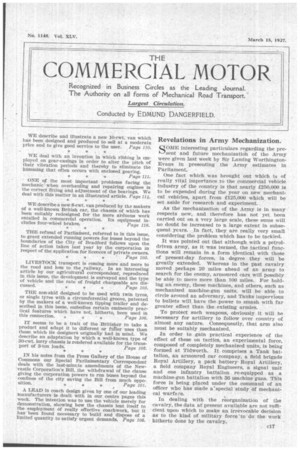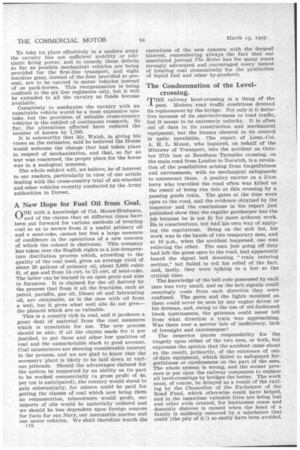Revelations in Army Mechanization.
Page 39

Page 40

If you've noticed an error in this article please click here to report it so we can fix it.
SOME interesting particulars regarding the present and future mechanizatioh of the Army were given last week by Sir Laming WorthingtonEvans in presenting the Army estimates in Parliament.
One fact which was brought out which is of really vital importance to the commercial vehicle Industry of the country is that nearly £250,000 is to be expended during the year on new mechanical vehicles, apart from £125,000 which will be set aside for research and experiment.
As the` mechanization of the Army is in many respects new, and therefore has not yet been carried out on a very large scale, these sums will no doubt he increased to a large extent in subsequent years. In fact, they are really very small considering the problem which has to be tackled.
It was pointed out that although with a petroldriven army, as it was termed, the tactical functions will remain in a form identical with those of present-day forces, in degree they will 'be greatly extended. Whereas in the past cavalry moved perhaps 20 miles ahead of an army to search for the enemy, armoured cars will possibly be able to move more than 100 miles. For holding an enemy, these machines, and others, such as mechanized machine-gun units, will be able to circle around an adversary, and Tanks impervious to bullets will have the power to smash with far greater, effect than the existing armies.
To protect such weapons, obviously it will he necessary for artillery to follow over country of almost any nature. Consequently, that arm also must be suitably mechanized.
In order to gain practical experience of the effect of these on tactics, an experimental force, composed of completely mechanized units, is being formed at Tidworth. It comprises a Tank battalion, an armoured car company, a held brigade Royal Artillery, a pack battery' Royal Artillery, a field company Royal Engineers, a signal unit and one infantry battalion re-equipped as a machine-gun battalion with 36 machine guns. This force is being placed under the command of an officer who has made especial study, of mechanical warfare.
In dealing with the reorganization of the cavalry, the data at present available are not sufficient upon which to make an irrevocable decision as to the kind of military force'to do the work hitherto done by the cavalry. • To take its place effectively in a modern army the cavalry has not sufficient mobility or adequate firing power, and to remedy these defects so far as possible mechanical vehicles are being provided for the first-line transport, and eight machine guns, instead of the four provided at present, are to be carried in motor vehicles instead of on pack-horses. This reorganization is being confined to the six line regiments only, but it will be extended to all the cavalry as funds become available.
Completely to mechanize the cavalry with an unsuitable vehicle would be a most expensive mistake, but the provision of suitable cross-country vehicles is the subject of continuous research. So far, the alterations effected have reduced the number of horses by 1,500.
It is noteworthy that Mr. Walsh, in giving his views on the estimates, said he believed the House would welcome the change that had taken place in respect of mechanization, and that, so far as war was concerned, the proper place for the horse was in a zoological museum.
The whole subject will, we believe, be of interest to our readers, particularly in view of our article dealing with the cross-country trial of six-wheeled and other vehicles recently conducted by the Army authorities in Dorset.
A New Hope for Fuel Oil from Coal.
0 ■ with a knowledge of Col. Moore-l3rabazon, and of the claims that at different times have been put forward for various methods of treating coal so as to secure from it a useful primary oil and a semi-coke, cannot but feel a large measure of confidence in the operations of a new concern of which the colonel is chairman. This company has taken over the English rights in a low-temperature distillation process which, according to the quality of the coal used, gives an average yield of about 20 gallons of primary oil, about 3,000 cubic ft. of gas and from 14 cwt. to 15 cwt. of semi-coke. The latter can be burned in an open grate and also in furnaces. It is claimed for the oil derived by the process that from it all the fractions, such as petrol, paraffin, gas oil, Diesel oil and lubricating oil, are obtainable, as Is the case with oil from a well, but it gives what well oils do not give— the phenols which are so valuable.
This is a country rich in coal, and it produces a great deal of material from the coal measures which is unsuitable for use. The new process should be able, if all the claims made for it are justified, to put these and other low qualities of coal and the unmarketable slack to good account. Coal mineowners are showing considerable interest in the process, and we are glad to know that the necessary plant is likely to be laid down at various pitheads. Should the advantages claimed for the system be supported by an ability on its part to be worked commercially (a gross profit of 4s. per ton is anticipated), the country would stand to gain substantially, for miners could be paid for getting the classes of coal which now bring them no remuneration, mineowners would profit, our imports of oils would be materially reduced and we should be less dependent upon foreign sources for fuels for our, Navy, our mercantile marine and our motor vehicles. We shall therefore watch the cl S operations of the new concern with the deepest interest, remembering always the fact that our associated journal The Motor has for many years strongly advocated and ,encouraged every means of treating coal economically for the production of liquid fuel and other by-products.
The Condemnation of the Levelcrossing.
THE railway level-crossing is a thing of the past. Modern road traffic conditions demand its replacement by the bridge. Not only is it defective because of its obstructiveness to road traffic, but it seems to be extremely unlucky. It is often out of date in its construction and mechanical equipment, but the human element in its control is quite unreliable. The report of Lieut.-Col. A. H. L. Mount, who inquired, on behalf of the Minister of Transport, into the accident on October 27th last at Roudham Turnpike crossing, on the main road from London to Norwich, is a revelation of the possibilities arising from forgetfulness and carelessness, with no mechanical safeguards to counteract them. A poultry carrier on a 2-ton lorry who travelled the road often was killed as the result of being run into at this crossing by a passing goods train. The gates at the time were open to the road, and the evidence obtained by the inspector and the conclusions in his report just published show that the regular gatekeeper has the job because he is not fit for more arduous work. He is conscientious, but had his own way of applying the regulations. Being on the sick list, his work was in the hands of two temporary men, and at 10 p.m., when the accident happened, one was relieving the other, The man just going off duty had left the gates open to the road, had apparently heard the signal bell denoting "train entering section," but failed to tell his relief of the fact, and, lastly, they were talking in a hut at the critical time.
The knowledge of the bell code possessed by each man was very small, and as the bell signals could seemingly come from each direction they were confused. The gates and the lights mounted on them could never be seen by any engine driver or his fireman, and, owing to the use of old-fashioned Nock instruments, the gateman could never tell from what direction a train was approaching. Was there ever a sorrier tale of inefficiency, lack of foresight and carelessness?
The inspector places responsibility for the tragedy upon either of the two men, or both, but expresses the opinion that the accident came about as the result, primarily, of the existence of outof-date equipment, which failed to safeguard forgetfulness or carelessness on the part of the men. The whole system is wrong, and the sooner pressure is put upon the railway companies to replace all level-crossings by bridges the better. The work must, of course, be delayed as a result of the raiding by the Chancellor of the Exchequer of the Road Fund, which otherwise could have helped, and in the meantime valuable lives are being lost and other evils created, for businesses cease and domestic distress is caused when the .head of a family is suddenly removed by a mischance that could (the pity of it !) so easily have been avoided.












































































































